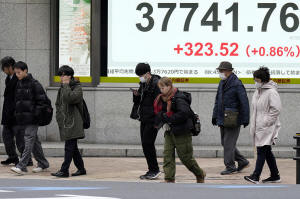Stock market today: Asian shares rebound as Trump's pullback on some
tariffs cheers investors
[March 06, 2025] By
ELAINE KURTENBACH
BANGKOK (AP) — Asian shares were mostly higher Thursday, tracking a
rebound on Wall Street after President Donald Trump pulled back on some
of his tariffs hikes.
U.S. futures were little changed, while benchmarks surged in Japan and
China.
Trump’s decision to give a one-month exemption for U.S. automakers on
his 25% tariffs for Mexican and Canadian imports raised hopes he may
avoid a worst-case trade war that grinds down economies and sends
inflation higher.
Tokyo's Nikkei 225 index gained 0.8% to 37,704.93. Japanese automakers'
shares surged in U.S. trading, though Toyota Motor Corp.'s shares fell
back in Tokyo trading. losing 1%. Honda Motor Corp. gained 2% and Nissan
Motor Co. rose 1.1%.
Hong Kong's Hang Seng index jumped 3.3% to 24,362.68 following Chinese
government reports to the annual legislative session that showed a
greater resolve by Beijing to boost consumer spending and other domestic
demand.
The Shanghai Composite index advanced 1.2% to 3,381.10.
South Korea's Kospi jumped 0.7% to 2,576.16, while the S&P/ASX 200 in
Australia slipped 0.6% to 8,094.70.
Taiwan's Taiex shed 0.7%, while the SET in Bangkok skidded 0.6%.
On Wednesday, gains for Ford Motor and GM stocks helped lead Wall Street
higher.

The S&P 500 rose 1.1% to 5,842.63, while the Dow Jones Industrial
Average added 1.3% to 43,006.59. The Nasdaq composite was 1.6% higher,
closing up 1.5% at 18,552.73.
Trump said he was granting a one-month exemption for U.S. automakers on
his 25% tariffs for Mexican and Canadian imports after talking with
Ford, General Motors and Stellantis, which owns Chrysler. That sent
relief through Wall Street, and Ford's and General Motors' stock both
jumped more than 5% to help lead a widespread rally across the market.
The worry has been that such tariffs would not only hurt profits for
companies but also jack up prices for cars and other bills for U.S.
households that are already struggling with still-high inflation. The
hope is that Trump is using the threat of tariffs as a negitating tool
and ultimately may institute less painful moves for the economy and
global trade if he can win what he wants.
Trump did not roll back all of the tariffs he announced on the United
States' largest trading partners, including on China. He said in an
address before Congress Tuesday night that he’s going ahead with
additional tariffs on track to go into effect on April 2.
[to top of second column] |

People walk in front of an electronic stock board showing Japan's
Nikkei index at a securities firm Thursday, March 6, 2025, in Tokyo.
(AP Photo/Eugene Hoshiko)
 He has upped uncertainty in markets
already reeling after he said Monday that there was no more room for
negotiations. The higher tariffs effect Tuesday, causing the U.S.
stock market to tumble.
Whatever the outcome, just the threat of tariffs
has hit U.S. households and businesses, with consumer confidence
souring sharply because of expectations they will fuel inflation.
With all the changes coming from Washington, U.S. manufacturers say
their growth is approaching stall-speed amid worries about tariffs.
Reports Wednesday gave a mixed read on the U.S. economy. A report
from ADP suggested U.S. employers pulled back sharply on their
hiring last month, a possible warning signal ahead of a more
comprehensive jobs report due out Friday from the U.S. Labor
Department.
A separate report said growth for U.S. finance, real estate and
other businesses in the services sector is better than economists
expected. But businesses also said in the survey they’re confronting
“chaos” and uncertainty because of tariffs, according to the
Institute for Supply Management.
A recent stream of weaker-than-expected reports on the U.S. economy
has raised the possibility of a worst-case scenario known as
“stagflation.” It's something that doesn’t happen often, where the
economy is stagnating and inflation is high.
The U.S. economy closed out last year running at a solid pace. If it
weakens, the Fed can cut its main interest rate to make borrowing
easier and goose growth. But rate cuts push inflation higher. It
could be boxed in if prices for eggs and other everyday items surge
because of tariffs.
In other dealings early Thursday, U.S. benchmark crude oil added 58
cents to $66.89 per barrel, while Brent crude, the international
standard, was up 56 cents, to $69.86 per barrel.
The U.S. dollar fell to 148.51 Japanese yen from 148.89 yen. The
euro climbed to $1.0803 from $1.0790.
All contents © copyright 2025 Associated Press. All rights reserved
 |